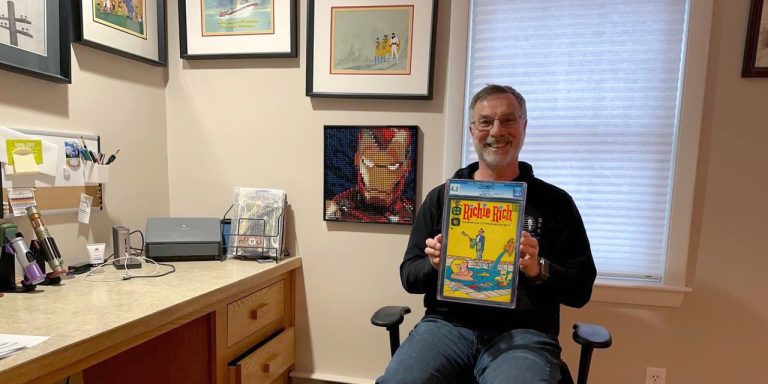Comic book collectors have long been obsessed with Superman, Spider-Man, and a wide range of superheroes. This has led to higher prices for some titles, including sales of more than $3 million for rare books.
But now some collectors are turning their attention to a completely different type of comic book character and asking the question: Is it possible to get rich from Richie Rich?
Yes, Richie Rich, the character also known as “Poor Little Rich Boy” and the namesake behind a series of children's comic books that were popular in the 1960s and 1970s.
Granted, the character hasn't appeared again in the past few years in movies or television unlike many superheroes or even the Archie fandom (think The CW's “Riverdale” series). But old Richie Rich comic books are starting to find a bigger market, according to experts who follow the industry.
Consider that a new record of $108,000 was set last year for Richie Rich's #1 book, dating back to 1960. This was more than double the previous record of $48,995.
Next month, the collection of dozens of Richie Rich titles, including the No. 1 title and several other prized titles from the 1960s, will be part of an auction organized by ComicConnect, a New York-based auction company.
The Richie Rich titles will be sold individually, but ComicConnect co-founder Vincent Zorzolo says the collection as a whole is attracting a lot of interest.
“I've gotten several calls. People are very excited about it,” he said.

Some classic Richie Rich comic books, including #1 (far right).
Comic Connect
To be clear, no one is suggesting that Richie Rich is about to give the Marvel or DC superhero universe a real run for their money. Instead, at a time when superhero-focused collectors with limited resources are finding it difficult to purchase coveted titles, Richie Rich's “universe” represents an affordable alternative, comic book experts say. Since the price of titles is still relatively low, there is arguably a lot of opportunity to increase their value.
Barry Sandoval, vice president of Heritage Auctions, the prominent Texas-based auction house that sold Richie Rich's Painting No. 1 for $108,000, makes a strong comparison. He points out that a Richie Rich No. 1 in very good condition sells for about $1,000. In comparison, Fantastic Four No. 1, a Marvel comic from around the same time, goes for around $18,000 in equivalent condition.
Sandoval says the same value equation applies to many other comic books released by Ritchie Rich's now-defunct publisher Harvey Comics, whose portfolio generally focused on non-superhero characters and included beloved titles like Casper the Friendly Ghost and Little Dot. (Ritchie Rich first appeared in the book Little Dot from 1953.)
“If your goal is to have the most important Harvey Comics stories from the 1960s, you can achieve that for a fraction of what Marvel would cost,” Sandoval said.
The special appeal of Richie Rich lies in a variety of factors. The character represents a spirit of innocence far removed from the darker world of superheroes, says Philip Cole, the Boston-based comic collector who is behind the cache of Richie Rich books being auctioned off by ComicConnect.
“Richie Rich feels great,” Cole said.
Of course, there is also the nostalgia factor. Cole, 61, started buying Richie Rich books as a child and then built a more serious collection in his adult years, inspired by his childhood love of the character.
The same goes for John Sanderson, a 71-year-old art collector from Arizona who is a huge fan of Richie Rich and other Harvey Comics characters.
“It's like when you're a kid, they become your friends,” he said.
Zorzolo has another theory about Richie Rich's appeal, which relates to the book's basic premise and its presentation of a privileged child in all his ridiculous adventures and escapades (filled with a butler named Cadbury). Specifically, we're always fascinated by rich people and how they live, even if in this case we're talking about a comic book character and not a real person.
Either way, the world of wealth is captivating, Zorzolo said: “It's about making it big in America.”

